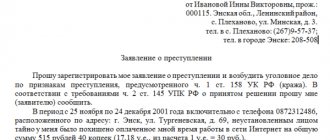ST 302 of the Criminal Code of the Russian Federation.
1. Forcing a suspect, accused, victim, witness to give testimony or an expert, specialist to give an opinion or testimony through the use of threats, blackmail or other illegal actions on the part of the investigator or the person conducting the inquiry, as well as another person with the knowledge or tacit consent of the investigator or the person conducting the inquiry - is punishable by restriction of freedom for a term of up to three years, or forced labor for a term of up to three years, or imprisonment for the same term.
2. The same act, combined with the use of violence, bullying or torture, is punishable by imprisonment for a term of two to eight years.
Commentary to Art. 302 of the Criminal Code
1. The victim is a suspect, accused, victim, witness, expert or specialist.
2. The objective side is expressed in the form of coercive actions through the use of threats, blackmail or other illegal actions to give testimony and (or) conclusion. A threat is an information message that has a mental impact on a person, which expresses the intention to cause harm to this person, his loved ones, and the benefits and interests associated with them. Blackmail is the presentation of demands to obtain specified information under the threat of dissemination of compromising information and the occurrence of adverse consequences for the person in possession of it or his relatives. Other illegal actions include deception, the use of provocations, humiliating or cruel treatment, etc. These actions, combined with the use of violence, bullying or torture (Part 2), form a qualified crime. Bullying is a special type of humiliating, cruel treatment associated with moral and psychological physical impact through cynical humiliation of a person’s honor, dignity, beliefs, worldview, as well as through infliction of physiological deprivation (interrogations at night).
3. The crime is recognized as completed from the moment of committing actions aimed at forcing the specified persons to give testimony and (or) conclusion, regardless of the occurrence of socially dangerous consequences.
4. Forcing witnesses or extras to confirm false information contained in the protocol of the relevant investigative action is not subject to qualification under this article, but if there are appropriate signs, it may be qualified under Art. 285, 286 or 303 of the Criminal Code.
5. Special subject (investigator, person conducting the inquiry, persons exercising their powers (head of the investigative body, head of the inquiry body)) or general (other persons acting with the knowledge or tacit consent of the investigator or person conducting the inquiry who have reached the age of 16 age (usually law enforcement officers, employees of places of detention)).
Second commentary to Art. 302 of the Criminal Code of the Russian Federation
1. Detention carried out in the absence of the grounds specified in the Code of Criminal Procedure of the Russian Federation or in violation of at least one of the restrictive conditions is illegal. A detention carried out in gross violation of the procedure for its application established by law (for example, without drawing up a protocol, without indicating in it the time of detention or the time of its preparation) falls under the characteristics of the commented article.
2. Criminal procedural legislation regulates the grounds and procedure for detention. Detention must be lawful and justified. Legality should be understood as compliance with the norms of criminal procedural legislation regulating the procedure for applying the specified preventive measure and extending its validity period, and validity should be understood as the presence in the criminal case materials of information that confirms the need to use detention as a preventive measure.
Detention is considered illegal if:
a) there are no grounds for this specified in the law;
b) the rules and procedure for selecting this preventive measure are violated.
3. The criminal procedural legislation defines the terms of detention, the violation of which forms an independent type of the crime in question, specified in Part 2 of Art. 301 CC.
4. Crimes are considered completed from the moment the actions listed in the law are committed.
5. The subjective side is characterized by direct intent.
6. The subject of a crime is a justice official who has the right to detain or take into custody. Responsibility for illegal detention may be borne by investigators or investigators, and for illegal detention and detention - by judges.
7. In part 3 of Art. 301 of the Criminal Code specifies the qualifying feature - the onset of grave consequences. These may, for example, include the victim’s suicide or attempt on his life, mental illness or other harm to health, and the difficult financial situation of the family.
8. Coercion means that the person being interrogated is forced to testify and this testimony is not given of his own free will. Consequently, in a broad sense, coercion covers all illegal interrogation methods that violate the principle of voluntary testimony.
9. The concepts of expert, examination and conclusion of an expert, specialist are disclosed in criminal procedural law. In this case, the act is expressed in the fact that a person with special knowledge and appointed as an expert or involved in procedural actions as a specialist is forced to draw up a conclusion containing answers to the questions posed by the investigative body, or to give testimony.
10. For the characteristics of the threat, see the commentary to Art. 296 CC; blackmail - to art. 133 CC. Other illegal actions are any provocative interrogation methods, the use of falsified evidence, the unlawful detention of a witness in order to obtain testimony favorable to those conducting the investigation, false promises to drop the case, change the preventive measure, allow a visit, etc. The following is also considered illegal: the use of hypnosis, drugs, alcohol and alcohol-containing drugs to obtain the desired indications; involving psychics in obtaining evidence, etc.
11. The crime is considered completed from the moment the coercion is committed.
12. The subjective side is characterized by direct intent.
13. The subject of the crime is the investigator or the person conducting the inquiry.
14. Violence as a method of coercion to give testimony or to give an opinion is characterized by the use of various forms of physical pressure on the interrogated person, expert or specialist. Consequences in the form of causing serious harm to health or death of the victim entail liability for a set of crimes classified under Art. 302 and 111 or 105 of the Criminal Code. Mockery is mockery, especially humiliating treatment of the person being interrogated or an expert, various kinds of insults that humiliate his honor and dignity, causing him moral and physical suffering. The concept of torture is explained in the note to Art. 117 CC.
Article 302. Claiming property from a bona fide purchaser
ECHR Ruling of 04/11/2017 50. The applicant argued that the interference with his property rights was not in accordance with the current legislation. In his opinion, the Moscow authorities could not, on the basis of Article 302 of the Civil Code of the Russian Federation, reclaim the apartment from him, since he was a bona fide buyer. The Moscow authorities decided to voluntarily cede ownership of the apartment and transfer it to K. They checked and authorized all transactions in relation to the apartment. The applicant considered that his situation was close to that considered by the European Court in the Gladysheva case (cited above, §§ 77-83). In particular, he argued that the loss of property constituted a disproportionate interference with his rights under Article 1 of Protocol No. 1 to the Convention. The authorities placed an excessive burden on him. Although he was a bona fide purchaser, they did not strike a fair balance between their decision to reclaim the property from him and his personal interests. He also alleged that government authorities were responsible for fraudulent transactions in relation to the apartment he later purchased. The authorities were obliged to verify the compliance of these transactions with applicable law. However, they failed to do this in a timely and proper manner, and they succeeded in reclaiming the property from him only in gross disregard of his interests. Lastly, the applicant alleged that he was deprived of his property without any compensation.
“Review of the practice of the Constitutional Court of the Russian Federation for 2017”
34. By Resolution No. 16-P of June 22, 2021, the Constitutional Court assessed the constitutionality of the provision of paragraph 1 of Article 302 of the Civil Code of the Russian Federation. The subject of consideration was the contested provision providing for the right of the owner to reclaim property belonging to him from a bona fide purchaser in the case when this property left the owner’s possession against his will - in relation to cases of reclaiming residential premises that were escheated property.
Determination of the Judicial Collegium for Economic Disputes of the Supreme Court of the Russian Federation dated 02/05/2019 N 308-ES15-12864 in case N A15-1976/2014
Having examined and assessed the presented evidence according to the rules of Article 71 of the Arbitration Procedure Code of the Russian Federation, guided by Articles , , 166, 168, 209, 301, 302, 305 of the Civil Code of the Russian Federation (hereinafter referred to as the Civil Code), Articles 15, 20 - 24, 45, 60, 62 Land Code of the Russian Federation (hereinafter referred to as the Land Code of the Russian Federation), the provisions of Federal Law dated October 25, 2001 N 137-FZ “On the implementation of the Land Code of the Russian Federation” (hereinafter referred to as Law N 137-FZ) and the explanations set out in the resolution of the Plenum of the Supreme Court of the Russian Federation and the Plenum of the Supreme Arbitration Court of the Russian Federation dated April 29, 2010 N /22 “On some issues arising in judicial practice when resolving disputes related to the protection of property rights and other property rights” (hereinafter referred to as Resolution N 10/22), courts after the next consideration of the dispute, they satisfied the stated requirements, coming to the conclusion that the local government body could not dispose of the disputed land plots, since the right of permanent (perpetual) use of the Company was not terminated in the manner prescribed by law; lease (sublease) agreements for land plots concluded by the Committee with individuals and the Company, as well as by the Company with an individual, are invalid (void) transactions from the moment of their completion, not entailing legal consequences.
Ruling of the Supreme Court of the Russian Federation dated January 10, 2019 N 305-ES18-13560 in case N A40-72863/2015
Having assessed the evidence presented in the case, the courts came to the conclusion that an unauthorized person disposed of a 75% share in the authorized capital of the Biznesstroy company on behalf of a foreign company; termination of rights to a share occurred against the will of this company and it has the right to demand restoration of rights to this share in relation to the provisions of Articles 301 and 302 of the Civil Code of the Russian Federation.
Ruling of the Supreme Court of the Russian Federation dated January 18, 2019 No. 309-KG18-22949 in case No. A60-25422/2017
When accepting the appealed judicial acts, the courts, guided by the provisions of Articles 168, 301, 302 of the Civil Code of the Russian Federation, the explanations contained in the resolution of the Plenum of the Supreme Court of the Russian Federation and the Plenum of the Supreme Arbitration Court of the Russian Federation dated April 29, 2010 N / 22 “On some issues arising in judicial practice when resolving disputes related to the protection of property rights and other property rights,” having examined and assessed the evidence presented in the case in accordance with Article 71 of the Arbitration Procedure Code of the Russian Federation, they recognized the institution’s claim as justified.
Ruling of the Supreme Court of the Russian Federation dated 02/04/2019 N 310-ES18-24262 in case N A83-1613/2017
In resolving the stated claims, the courts, guided by the provisions of Articles 301, 302 of the Civil Code of the Russian Federation, Part 3 of Article 7, Part 1 of Article 12.1 of the Federal Constitutional Law of March 21, 2014 N 6-FKZ “On the admission of the Republic of Crimea to the Russian Federation and the formation within the Russian Federation of new subjects - the Republic of Crimea and the federal city of Sevastopol", paragraph 1 of Article 2.1 of the Law of the Republic of Crimea dated July 31, 2014 N 38-ZRK "On the peculiarities of regulating property and land relations in the territory of the Republic of Crimea", explanations given in the joint resolution of the Plenums of the Supreme The courts of the Russian Federation and the Supreme Arbitration Court of the Russian Federation dated April 29, 2010 N /22 “On some issues arising in judicial practice when resolving disputes related to the protection of property rights and other property rights” did not see legal grounds for satisfying society’s demands, since the plaintiff, referring to the existence of a registered right to movable property, did not confirm the grounds for its occurrence (a contract of sale, exchange, gift or other transaction for the acquisition of this property), while insisting on considering the case on the basis of the available evidence.
Determination of the Judicial Collegium for Economic Disputes of the Supreme Court of the Russian Federation dated 02/05/2019 N 308-ES15-12864 in case N A15-1976/2014
Having examined and assessed the presented evidence according to the rules of Article 71 of the Arbitration Procedure Code of the Russian Federation, guided by Articles , , 166, 168, 209, 301, 302, 305 of the Civil Code of the Russian Federation (hereinafter referred to as the Civil Code), Articles 15, 20 - 24, 45, 60, 62 Land Code of the Russian Federation (hereinafter referred to as the Land Code of the Russian Federation), the provisions of Federal Law dated October 25, 2001 N 137-FZ “On the implementation of the Land Code of the Russian Federation” (hereinafter referred to as Law N 137-FZ) and the explanations set out in the resolution of the Plenum of the Supreme Court of the Russian Federation and the Plenum of the Supreme Arbitration Court of the Russian Federation dated April 29, 2010 N /22 “On some issues arising in judicial practice when resolving disputes related to the protection of property rights and other property rights” (hereinafter referred to as Resolution N 10/22), courts after the next consideration of the dispute, they satisfied the stated requirements, coming to the conclusion that the local government body could not dispose of the disputed land plots, since the right of permanent (perpetual) use of the Company was not terminated in the manner prescribed by law; lease (sublease) agreements for land plots concluded by the Committee with individuals and the Company, as well as by the Company with an individual, are invalid (void) transactions from the moment of their completion, not entailing legal consequences.
Ruling of the Supreme Court of the Russian Federation dated March 15, 2019 N 308-ES19-1246 in case N A63-6298/2016
Resolving the dispute, the district court, guided by the provisions of Articles 223, 301, 302 of the Civil Code of the Russian Federation, taking into account that the property was alienated not by Sasina G.A., but by another person in a gratuitous transaction, on the basis of a forged document, without the will of the legal owner, presence of will Sasina G.A. the alienation of the disputed objects has not been confirmed, came to the conclusion that the disputed property can be claimed from a bona fide purchaser.
Determination of the Constitutional Court of the Russian Federation dated February 28, 2019 N 347-O
POINT 1 OF ARTICLE 302 OF THE CIVIL CODE OF THE RUSSIAN FEDERATION The Constitutional Court of the Russian Federation, composed of Chairman V.D. Zorkin, judges A.I. Boytsova, G.A. Gadzhieva, Yu.M. Danilova, L.M. Zharkova, S.M. Kazantseva, S.D. Knyazeva, A.N. Kokotova, L.O. Krasavchikova, S.P. Mavrina, N.V. Melnikova, Yu.D. Rudkina, O.S. Khokhryakova, V.G. Yaroslavtseva,
Determination of the Constitutional Court of the Russian Federation dated February 28, 2019 N 346-O
As stated in the decisions of the Constitutional Court of the Russian Federation dated April 21, 2003 N 6-P and June 22, 2021 N 16-P and its other decisions, legal regulation, according to which the protection of the rights of a person who considers himself the owner of property is possible by satisfaction of a vindication claim, if there are grounds for this provided for in Article 302 of the Civil Code of the Russian Federation, meets the goals of ensuring the stability of civil circulation and is generally aimed at establishing a balance of rights and legitimate interests of all its participants.
Ruling of the Supreme Court of the Russian Federation dated 04/08/2019 N 308-ES18-25496 in case N A32-12361/2017
The courts of the first and appellate instances, having examined and assessed, according to the rules of Article 71 of the Arbitration Procedure Code of the Russian Federation, the evidence presented in the case materials, guided by Articles 27, 28, paragraph 1 of part 1 of Article 150 of the Arbitration Procedure Code of the Russian Federation, Articles 167, 168, 169, 181, 302 of the Civil Code of the Russian Federation (hereinafter referred to as the Civil Code of the Russian Federation), subparagraph 5 of paragraph 1 of Article 1 of the Land Code of the Russian Federation (hereinafter referred to as the Land Code of the Russian Federation), explanations given in paragraphs 34, 35, 52 of the resolution of the Plenum of the Supreme Court of the Russian Federation and the Plenum of the Supreme Arbitration Court of the Russian Federation dated 29.04. 2010 N /22 “On some issues arising in judicial practice when resolving disputes related to the protection of property rights and other real rights” (hereinafter referred to as Plenum Resolution No. 10/22), we came to the conclusion that there were grounds for terminating the proceedings in the case in part of the Partnership’s demands for the elimination of obstacles in the use of the land plot and the demolition of the disputed real estate object - an apartment building and the absence of grounds for satisfying the claim in the rest, including due to the plaintiff missing the statute of limitations, the application of which was stated by the defendants.




